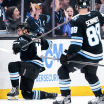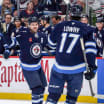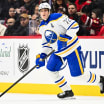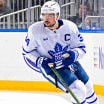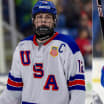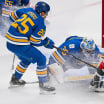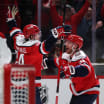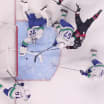NHL.com is providing in-depth analysis for each of its 30 teams throughout August. Today, the biggest reasons for optimism and the biggest questions facing the Minnesota Wild:
The Minnesota Wild are one of seven teams to make the Stanley Cup Playoffs in the past four seasons, but they have not advanced to the conference final since 2003.
Reasons for optimism, questions facing Wild
Minnesota hoping coach Bruce Boudreau, size up front, reverse playoff fortunes
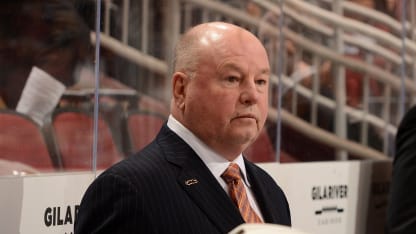
© Norm Hall/Getty Images
By
Dan Myers
Wild.com
The Wild are counting on new coach Bruce Boudreau and a few tweaks to the roster to help them reach the next level.
Boudreau was hired May 7 after spending five seasons with the Anaheim Ducks. The Wild also signed unrestricted free agent forwards Eric Staal and Chris Stewart, and goalie Alex Stalock, on July 1.
Wild 30 in 30: Season outlook | Top prospects | Fantasy outlook
Here are four reasons for optimism entering this season:
1. A proven winner behind the bench
Boudreau won eight division championships in nine seasons as coach of the Washington Capitals and Ducks, and became the fastest NHL coach to reach 400 wins (663 games) on March 5. He is one of seven coaches to win at least 200 games with two teams, and his .659 points percentage is the highest among active NHL coaches.
"Once Bruce became available and we had a chance to meet, it mostly became about, 'Can we get him signed?'" Wild general manager Chuck Fletcher said May 10. "It's very rare that you get an opportunity to sign a coach with his credentials."
Boudreau's regular-season track record could be a welcome boost for the Wild, who had the most points through 41 games (52) in their history before going 1-11-2 from Jan. 10 to Feb. 13 to cost coach Mike Yeo his job. John Torchetti replaced him, and it took a six-game winning streak in late March, and some help, for the Wild to clinch the second wild card into the playoffs from the Western Conference.
2. Defensive depth
The strength of the Wild is their depth on defense with a top four of Ryan Suter, Jared Spurgeon, Marco Scandella and Jonas Brodin, each signed to a long-term contract.
Suter, 31, averaged 28:35 of ice time per game last season, second in the League (Erik Karlsson, Ottawa Senators, 28:58). Suter is one of the NHL's best and could be even better this season if Boudreau can find a way to trim his minutes.
Spurgeon, Scandella and Brodin are 26 years old or younger. Matt Dumba, 22, and Mike Reilly, 23, are coming into their own and will be pushed by Christian Folin and prospect Gustav Olofsson.
Dumba, who was a restricted free agent, signed a two-year, $5.1 million contract July 28, providing the Wild with an opportunity to evaluate his development before deciding what to do next.
"We have high expectations for Matt going forward," Wild assistant general manager Brent Flahr said. "We think he's going to be a point-producing defenseman and we hope he keeps going and improving. We know he's going to get his day, and hopefully, next time, it's a long-term deal that keeps him in a Wild uniform for a long time."
3. Size up front
Staal (6-foot-4, 205 pounds) and Stewart (6-2, 231), provide much-needed size to the lineup. The goal is for those players, along with Charlie Coyle (6-3, 218) and Mikko Koivu (6-3, 215), to do some of the dirty work along the boards to set up Minnesota's smaller, faster forwards Mikael Granlund (5-10, 184), Erik Haula (6-0, 193) and Jason Zucker (5-11, 185).
The additions also give the lineup more balance, something that has been missing in recent years.
4. Experience in goal
When the offseason began, the belief was the Wild would trade backup goaltender Darcy Kuemper, who can become an unrestricted free agent after this season. Kuemper has shown the ability to be a quality NHL starter, but with Devan Dubnyk in the second season of a six-year, $26 million contract, the chances of Kuemper getting to be the No. 1 goalie in Minnesota seem slim.
Instead, Kuemper remains with the Wild. And with Dubnyk turned 30 on May 4 and playing 67 games last season, Boudreau could try to get Kuemper more games to lighten Dubnyk's load.
In addition to keeping Kuemper, the Wild agreed to terms with Stalock on a one-year, two-way contract. Stalock is expected to receive big minutes with Iowa of the American Hockey League and provide depth behind Dubnyk and Kuemper.
Here are three key questions facing the Wild:
1. How much can Eric Staal contribute?
Staal hasn't had a 30-goal season since he scored 33 for the Carolina Hurricanes in 2010-11, and he's seen his point production decrease in each of the past four 82-game seasons. His 13 goals and 39 points in 83 games with the Hurricanes and New York Rangers last season were the fewest since he had 11 goals and 31 points as a rookie with the Hurricanes in 2003-04.
A number of factors may have contributed to those statistics. There wasn't much around him in Carolina. And after being traded to New York, his role wasn't clearly defined, nor was his spot in the lineup.
Those won't be issues in Minnesota. The belief is Staal will be put in a position to succeed, perhaps centering Zach Parise on a line that will be counted on to produce goals and points in bunches.
"When you're 32 years old (Staal will turn 32 on Oct. 29), you're not the same player you were when you were 25 or 26," Fletcher said. "But we think this is a good situation for Eric, and obviously he felt the same way. We have some quality players he can play with, and we certainly have an important role he can fill."
2. Which Jason Pominville will show up?
After scoring 30 goals in his first full season with the Wild in 2013-14, Pominville had 18 in 2014-15 and an NHL career low 11 last season. It took Pominville 22 games before he scored his first goal. After scoring four goals in his next 12 games, Pominville went another 16 before scoring again.
The good news for the Wild and Pominville was the success he found near the end of the season playing with Haula and Nino Niederreiter. They were the Wild's best line down the stretch and into the postseason, where Pominville had four goals and seven points during a six-game loss to the Dallas Stars in the first round.
Expect Boudreau to stick with that line early in the season in hopes Pominville's production will increase.
3. Can Bruce Boudreau get over the postseason hump?
Boudreau is 41-39 in the playoffs, including 1-7 in Game 7. His ability to put his finger on the reason why and to adjust accordingly could go a long way toward altering his reputation.
"Game 7s are sometimes a crapshoot, and I knew what was going to happen if we didn't win Game 7 [in Anaheim last season]," Boudreau said May 10. "But I believe good things happen to people that work hard. And even though the one door closed, the other one's opening, and it's a great new adventure and I look forward to it."
